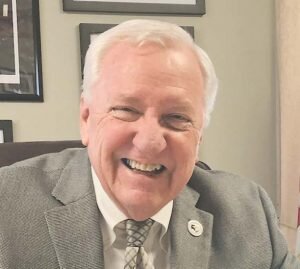By Morgan Pilz, Staff Writer
(June 4, 2020) Berlin officials approved the town’s $5.9 million general fund budget at its bi-monthly meeting at Town Hall last Tuesday, finalizing for the next fiscal year a financial package unchanged from when it was introduce on May 11.
Mayor Gee Williams said the new budget is 4 percent less than the current one. The town’s electric facility budget is $5.5 million while the water budget is just under $1 million. The sewer fund budget is $2.5 million, with an increase of 2 percent over the current year, and the stormwater fund budget dropped 17 percent to $379,000. Williams said the total package will be $15.1 million.

Gee Williams
During the May 11 meeting, the board voted leave the tax rate at .80 per $100.
Regarding concerns about the sewer and stormwater funds’ repayment of past loans from the general fund, Williams said payments will be made by both over the next several years.
“At that point, you know how much money is left and the excess money budgeted will be paid back to the reserve,” he said.
The board then opened the meeting to a public hearing on Facebook Live. As the meeting was technically closed to the public because to covid-19, all questions were received either through that channel or by email or mail.
Most of the questions were about the decisions made for each department. For instance, resident Jason Walter asked 15 questions ranging from the coverage of health insurance premiums to general fund overhead and overhead fund contributions.
One such question from Walters talked about customer service reimbursement, which according to him, had jumped 12.49 percent to $153,000.
Financial Director Natalie Saleh explained the change.
“The customer service expenditure budget goes out to the reimbursements from the utility funds,” she said. “The total of fiscal year 2021 proposed customer service budget went up 12.49 percent, so the electric, water and sewer picks up a certain percent so the increase is passed on back to the general fund.”
Williams added that this procedure is not unusual and occurs every year.
Walters also had concerns about the town’s tax rate, which he claimed was almost double Maryland’s state average, and asked about Berlin’s cost-of-living in regards to the tax.
“The [state] tax rates do not take into account that property values vary greatly throughout the state,” Williams said. “If you live in the Baltimore-Washington corridor, the rates would be lower but the actual taxes you pay per year are multiple times more than we would ever think of … our cost of living here is based on the values of the community.
“There are some people … their idea is that we should always strive to being the cheapest place to live, period,” he continued. “From my experience, as a [former] journalist of 30 years, I know the race to the bottom is a bottomless pit.”
Williams added that what makes the town so attractive is the realm of services offered as well as its location.
“What other towns notice from town services, quality of life and business community and the attraction to visitors … we’re the envy of the area,” he said. “It didn’t happen overnight. It took at least 30 years to get where we are.”
Resident Maria Azzari also asked about how the town would be affected by the pandemic, in particular regarding casinos. Williams admitted there would be an affect but that the town has always taken “a conservative approach” regarding the casinos.
Four of the five councilmembers approved the budget, with Councilmember Zackery Tyndall voting in opposition.
